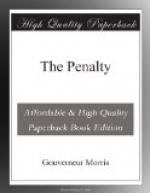To Wilmot a little encouragement was a great thing, a foundation upon which to undertake pyramids. Having intruded upon Barbara’s working hours without being scolded, Wilmot began to picture for himself a delightful life of intruding upon them every day. He hoped that if she was really working, she would not actually send him away, but let him sit in the deep chair by the fire and wait till she was through, and ready for talk and play. As much almost as he loved her, he hated her ambitions, if only because they interfered with him, and because he found it impossible to take them seriously. Her work seemed surprisingly good to him—not surprisingly good for a genuine sculptor who exhibited in salons, but for a girl of his own class whom he had always known. In this estimate he did not do Barbara justice. She had a fine natural talent and she had been well trained. People who knew what they were talking about, shock-headed young fellows with neighboring studios, prophesied great things for her, partly because she was beautiful, and partly because her work, as far as she had gone in it, was really good. What she lacked, they said, was inspiration, experience, and knowledge of life. When these things came to her in due time, her technique would be quite equal to expressing them.
Wilmot’s dream of being much in Barbara’s studio proved negotiable only as a dream. Barbara began a fountain for her father’s garden at Clovelly, and during the modelling of the central figure the studio was no place for a modest young man. He had one glimpse through the half-open door of a girl with very red hair and very white skin, and he turned and beat a decided retreat, blushing furiously. He did not repeat his visit to her studio until Barbara assured him that the nymph had put on her clothes and gone away. Then, much to his disgust, he found there a young fellow named Scupper, who smoked a vile pipe and had dirty finger-nails and was allowed to make himself at home because he had recently exhibited a portrait bust that everybody was praising (even Wilmot) and because he had volunteered during a delightful contemplation of Barbara’s face to do her portrait and tell her all that he had learned from his great master, Rodin.
The little beast had the assurance of the devil. He praised, blamed, patronized, puffed his pipe, and dwelt with superiority on topics which are best left alone, until Wilmot wanted to kick him downstairs. Scupper, aware of Wilmot’s dislike for him, and thoroughly cognizant of its causes, did his best to goad the “young prude” (as he chose to consider him) into open hostility. He strutted, boasted, puffed, and talked loosely without avail. Wilmot maintained a beautiful calm, and the more he raged internally the more Chesterfieldian and gorgeously at ease his manners became. Barbara enjoyed the contest between the terrier and the Newfoundland hugely. Personally she disliked Scupper almost as much as she liked Wilmot, but artistically she admired him tremendously and felt that his judgments and criticisms were the most valuable things to be had in the whole city.




